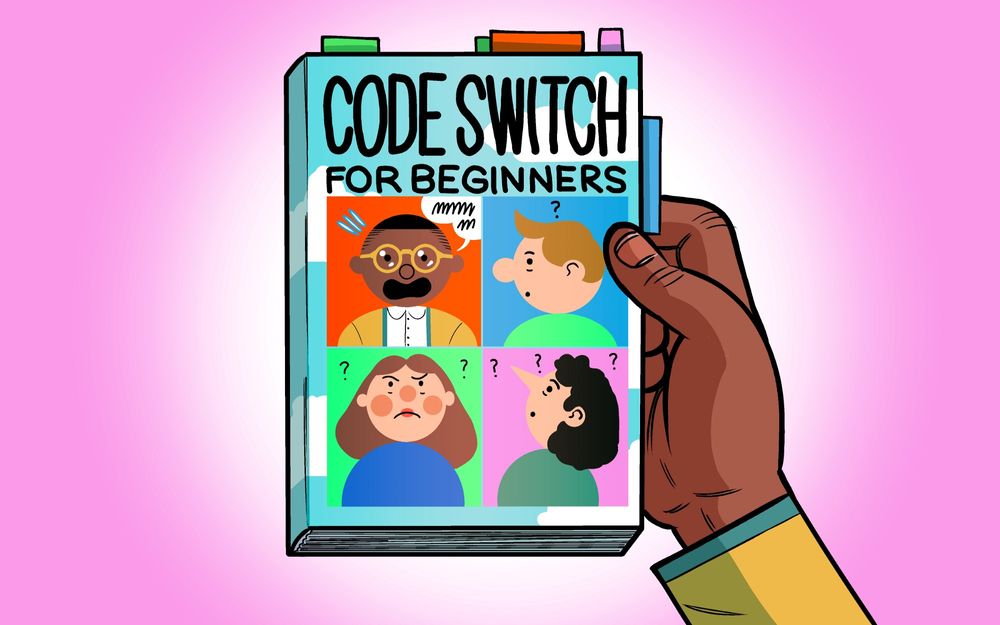Around this time last year, I had a professional breakthrough. Last summer, in the midst of various American institutions being taken to task for upholding systemic racism, I decided to shed my code-switching ways once and for all. Longtime readers may remember me pouring out a lil liquor for my White voice and making a personal promise to more closely align my out-of-office and on-the-clock personas. I’ve been logging on to work as my full Black self ever since.
I have no regrets about this subtle yet meaningful choice. Keepin’ it real hasn’t gone wrong yet. But if I’m being honest, there are still words and phrases in my vocabulary that I reserve for outside of work ecosystems. It’s especially palpable for me after spending weekends around my people — homecomings, weddings, cookouts, family reunions — before rejiggering the lexicon come Monday morning.
As soon as we were both seated, he started apologizing profusely, saying he had no idea of the connections between “itis” and harmful racial stigmas about laziness.
These tweaks aren’t about making anyone else feel comfortable. It’s more about reducing friction due to lingo getting lost in translation. For the sake of my sanity and convenience, what I want to say to my co-workers — whether in a meeting or during small talk — is usually conveyed in a manner I know they’ll understand.
Working virtually has only heightened these differences. I find myself wanting to communicate in video meetings or via Slack the same way that I do on my Very Black group texts or when I’m engaging on Clubhouse. But I don’t have patience for the question mark or thinking-emoji replies. Below, I’ve listed five common phrases or words that have recently come to mind while working — and the five things I ended up saying instead.
What I want to say: I can’t wait until outside opens back up.
What I say instead: I can’t wait until the pandemic is over.
On Black Twitter and other melanated corners of social media, “outside” is shorthand not just for anywhere beyond the walls of your home but particularly a context where folks are free to turn up at functions without fear. That time and place is still in flux as Covid-19 is popping up with more variants than Loki these days. But until then, I’ll keep the colloquialism outside of my corporate comms.
What I want to say: Nah.
What I say instead: No.
This one is simple, but the reason I’m mindful about using “nah” is twofold. First, it sounds lazy when spoken and dismissive in text — like “no” with a dash of IDGAF. It’s already hard enough to convey enthusiasm these days.
The other reason I don’t say “nah” to my co-workers: Those damn Rosa Parks T-shirts have gone mainstream. Something tells me I work with a few folks who barely passed their African American studies college elective — they’d probably think I’m quoting a historic civil rights icon when really I’m just saying I haven’t confirmed a proposed meeting time.
What I want to say: I have the itis.
What I say instead: I’m stuffed.
At a past job, I once overheard a White co-worker say he had “the itis” following what I’d imagine was a hearty lunch, full of foods that were either fried or processed as all hell. It struck me how casually he said it, especially considering that I never refer to itis in front of mixed company. I didn’t think he intended to offend, but I was also pretty sure he was ignorant to that word’s origin. I saw it as a teachable moment.
“Hey, Jeff,” I said. “Do you know where that term comes from?” He admitted he didn’t, and I told him to do his Googles. Within a few minutes, he booked a meeting room for us to talk. As soon as we were both seated, he started apologizing profusely, saying he had no idea of the connections between “itis” and harmful racial stigmas about laziness. I’m glad I got the chance to tell him “postprandial somnolence” — or “food coma” — works just fine.
What I want to say: Yessir!
What I say instead: Yep.
Not all AAVE holds up when being spelled out; “yessir” is one of those words. When I was in the office, if a co-worker asked if I watched Game of Thrones the night before, “yessir!” would leap out of my mouth, word to 2000s-era Jay-Z and Pharrell. Simple enough. But when committed to text, it just looks like my spacebar is broken.
What I want to say: Prayers up.
What I say instead: My condolences.
This well-intentioned, bare-minimum means of expressing sympathy is often accompanied on social media by that ubiquitous prayer hand emoji. And while we’ve all seen colleagues experience personal hardships and loss, “prayers up” is a bit too casual. Plus, the religious subtext is probably better served outside of the workplace. Amen to that.
